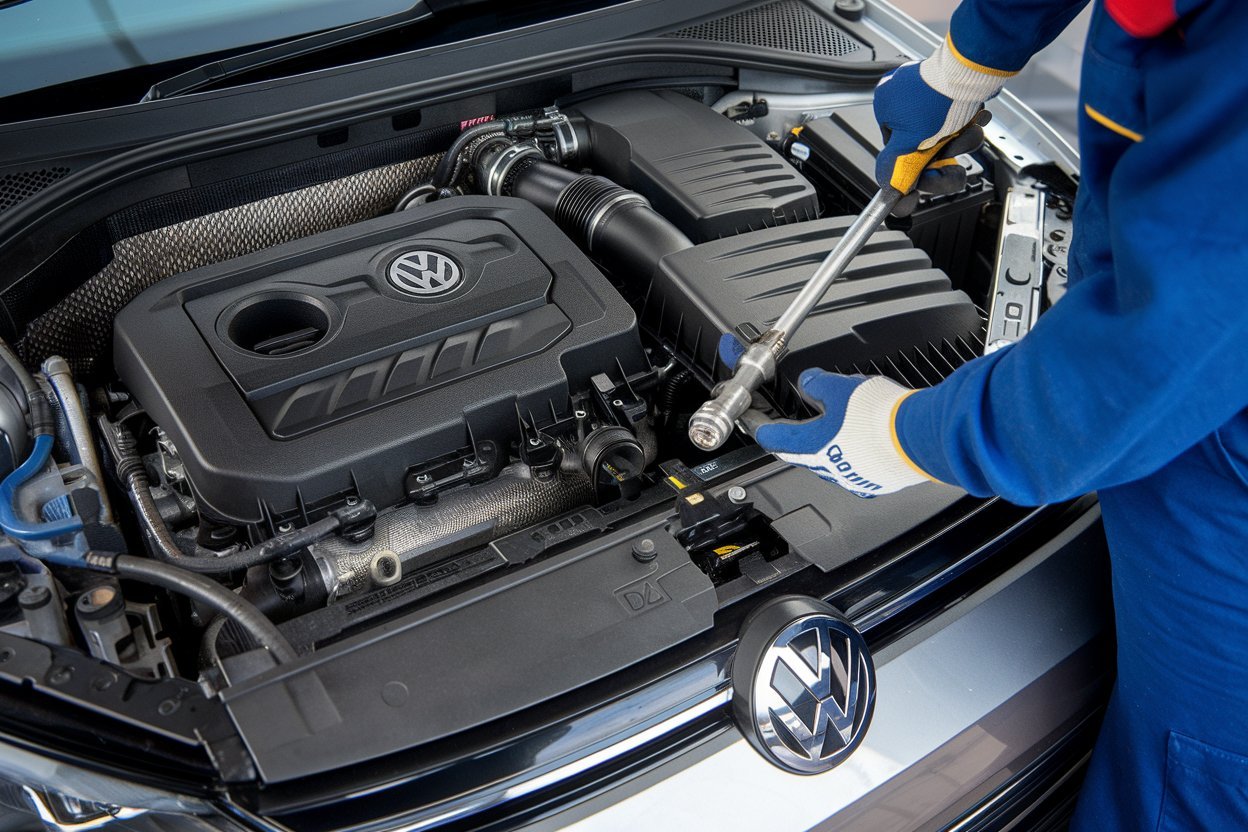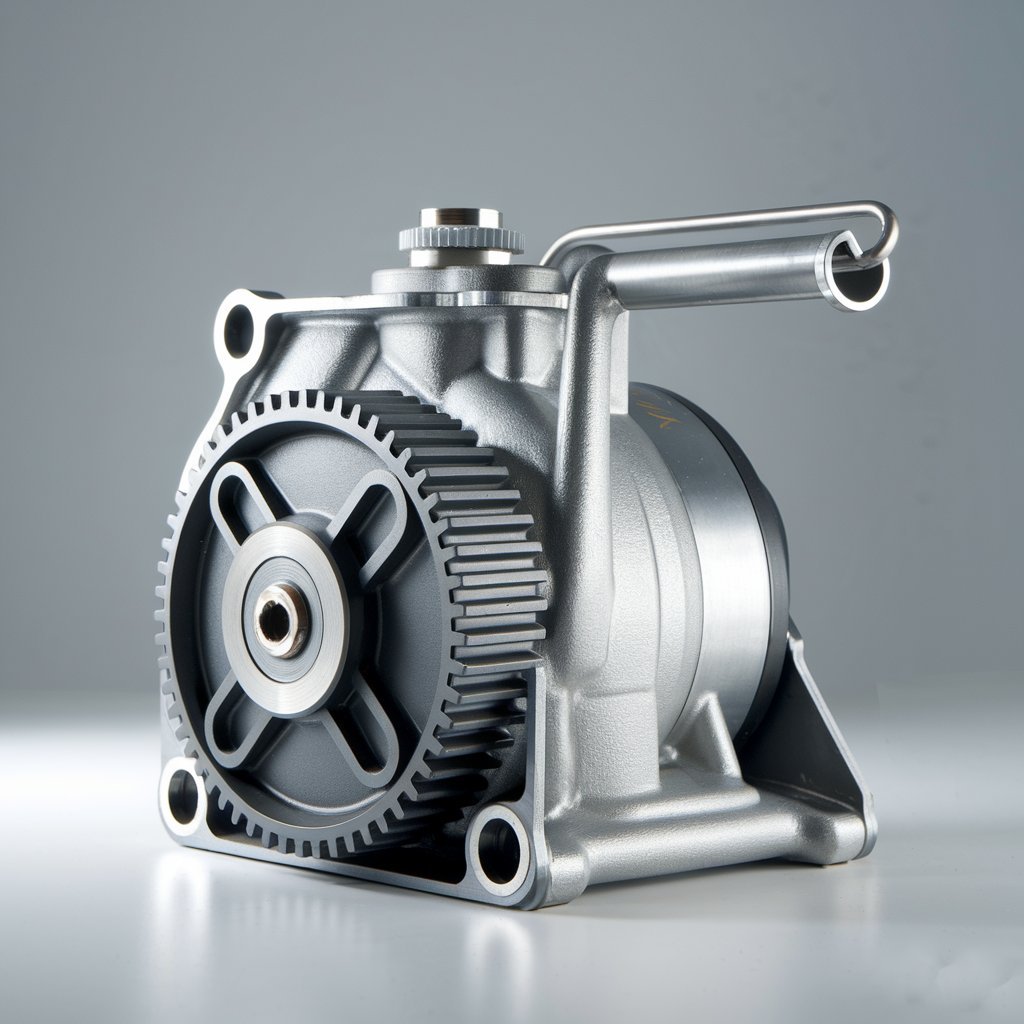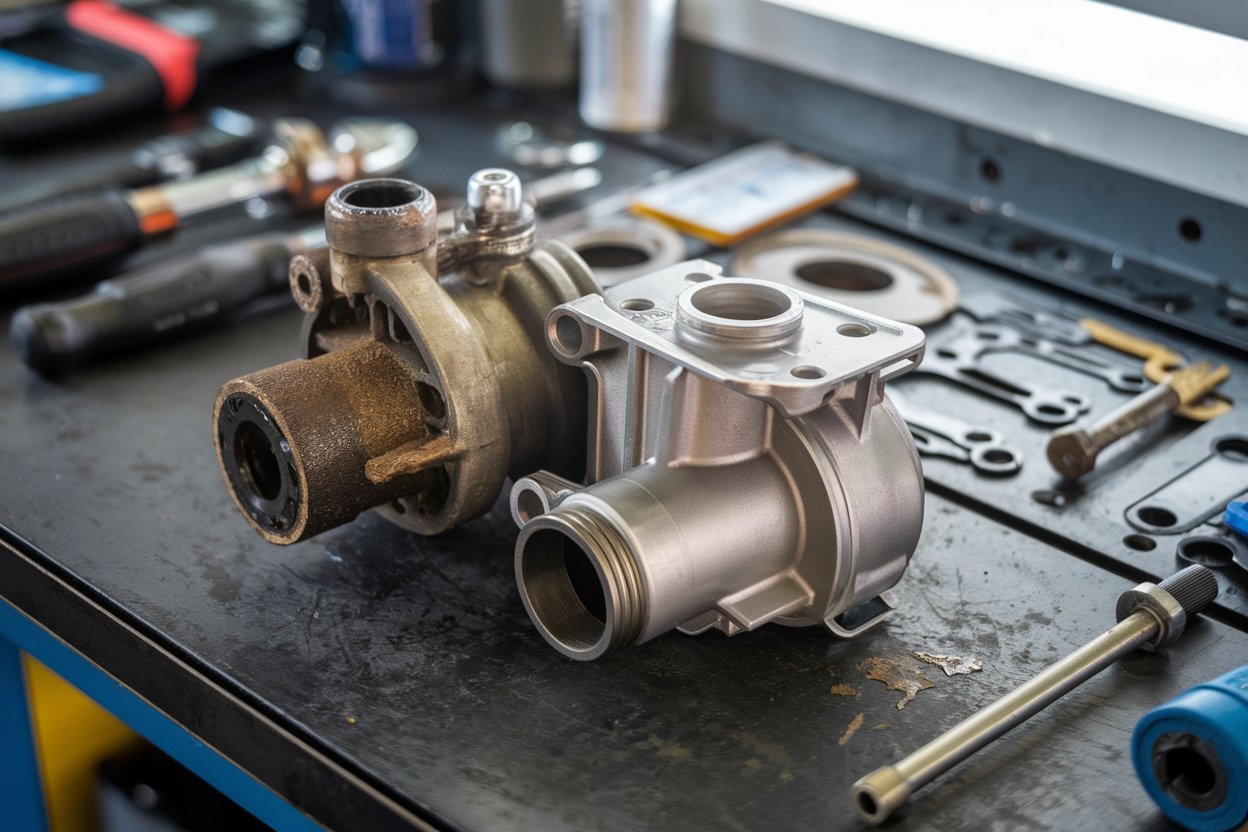Is your Volkswagen Golf oil pump showing signs of failure? Low oil pressure, engine overheating, and unusual ticking noises can lead to serious engine damage if ignored. A failing oil pump can cause 40% faster wear on vital engine components, reducing performance and lifespan. At our Volkswagen repair workshop in Dubai, we provide expert VW Golf oil pump replacement using genuine OEM parts for long-term reliability. Get a 20% discount on oil pump replacement services this month. Book your appointment today and keep your engine running smoothly!

The oil pump in a Volkswagen Golf is a crucial component of the engine lubrication system. It ensures a steady flow of engine oil to all moving parts, reducing friction and preventing overheating. Without a properly functioning oil pump, critical engine components like the crankshaft, camshaft, and bearings can suffer severe damage.
The oil pump draws oil from the oil pan, pressurizes it, and distributes it to key engine parts. It ensures the oil reaches areas like the valves, pistons, and camshafts, keeping them lubricated and reducing wear. The pump also helps in cooling the engine by dissipating excess heat generated during combustion.
The oil pump placement in a Volkswagen Golf depends on whether the engine is petrol (TSI) or diesel (TDI). While both types of engines rely on an oil pump for lubrication, cooling, and performance, their placement and drive mechanisms can differ due to variations in engine design, oil pressure requirements, and lubrication needs.
A failing Volkswagen Golf oil pump can lead to severe engine damage if not replaced in time. Since the oil pump is responsible for maintaining proper lubrication and oil pressure, any malfunction can result in faster engine wear, overheating, and potential failure. Here are some specific warning signs that indicate your VW Golf’s oil pump needs urgent replacement.
The low oil pressure warning light on your dashboard is the first and most critical sign. If this light remains on even after an oil top-up, it could mean your oil pump is failing to generate the necessary pressure. Ignoring this warning can lead to engine seizure in extreme cases.
A failing oil pump can cause lifters, camshaft, or crankshaft to make a ticking or knocking sound due to insufficient lubrication. If you hear these noises, your engine parts may be grinding against each other, leading to 40% faster wear.
If your oil pump is failing to circulate oil properly, the engine loses its primary cooling mechanism. This results in a noticeable increase in engine temperature, often leading to coolant boiling or engine overheating warnings.
Some Volkswagen Golf models come with an oil pressure gauge. If you notice sudden drops or fluctuations in oil pressure, it’s a sign that your oil pump is struggling to maintain proper circulation. This inconsistency can cause uneven engine performance and increased wear on internal components.
If you find tiny metal particles in your oil during a routine oil change, it’s a serious red flag. A weak or failing oil pump allows friction between metal components, leading to internal wear and contamination of the oil system.
A failing oil pump can cause oil starvation, leading to difficulty starting your Golf, especially in the morning. In severe cases, low oil pressure can even cause the engine to stall while driving, creating a dangerous situation.

A failing oil pump in a Volkswagen Golf turbocharged engine can cause serious damage and lead to costly repairs. Turbo engines need high oil pressure for proper lubrication and cooling. Here’s how a bad oil pump affects performance:
If you notice low oil pressure, warning lights, or unusual engine sounds, visit a Volkswagen repair expert in Dubai for an oil pump check and replacement before it’s too late.
Replacing a VW Golf oil pump requires precision and expertise to ensure proper engine lubrication and performance. Our specialized VW technicians in Dubai follow a step-by-step process to replace the oil pump efficiently.
Replacing the oil pump in your Volkswagen Golf is crucial for maintaining optimal engine performance. In Dubai, the cost for this service can vary based on several factors, including labor charges, parts pricing, and the specific model of your vehicle. Below are some estimated costs:
Please note that these figures are approximate and can vary depending on your vehicle’s condition, model year, and the service center’s rates. For an exact quote tailored to your Volkswagen Golf, we recommend contacting us directly. Our team will provide a detailed assessment and competitive pricing to ensure your vehicle receives the best care.
Ensure your Volkswagen Golf’s engine stays protected with a professional oil pump replacement service in Dubai. A failing oil pump can cause low oil pressure, engine overheating, and potential turbocharger damage. Our certified Volkswagen specialists use genuine VW parts and follow manufacturer-approved procedures to restore your vehicle’s performance. Get a detailed inspection, expert installation, and premium engine oil refill at our Volkswagen repair center in Dubai. Book your service today and enjoy a 20% discount on oil pump replacement!

Choosing the right engine oil after an oil pump replacement is essential to ensure smooth engine performance, proper lubrication, and longer engine life. Volkswagen recommends using fully synthetic oil that meets VW 502.00 / 505.00 or VW 504.00 / 507.00 specifications. Here are the best options:
Trust our team of Expert Volkswagen Mechanics at our Volkswagen Service Center in Dubai for all your Volkswagen Repair and service needs.
Our Top-Notch Volkswagen Service Center in Dubai have the advanced diagnostic tools and Volkswagen experts to accurately identify and resolve any issues with your Volkswagen.
With over 1200+ Volkswagen repaired, our Volkswagen Service Center in Dubai is the trusted Garage for comprehensive and expert Volkswagen Repair services.
Most of the vehicles get damaged just because of maintenance neglect you take
Yes, continuing to drive with a failing oil pump can cause severe engine damage. A weak oil pump leads to low oil pressure, reducing lubrication and increasing friction between internal components like the crankshaft, camshaft, and pistons. This can result in overheating, premature engine wear, and, in extreme cases, complete engine failure.
Delaying an oil pump replacement can lead to critical engine problems, including:
Using a genuine Volkswagen oil pump is always recommended for optimal performance and engine longevity. Aftermarket oil pumps may not meet VW’s strict quality standards, leading to lower oil pressure, improper fitment, or premature failure. We only use OEM or high-quality VW-approved oil pumps to ensure long-term reliability and engine protection.
Yes, an oil change is essential after an oil pump replacement. Fresh high-quality synthetic oil ensures proper lubrication and removes any debris that may have entered the system during the repair. We use VW-approved 5W-30 or 5W-40 synthetic oils to keep your engine running smoothly.
Yes, using low-grade or incorrect engine oil can lead to oil pump failure over time. Poor-quality oil can thicken, create sludge, and clog oil passages, reducing the oil pump’s efficiency. Regular oil changes with manufacturer-recommended synthetic oil help prevent oil pump wear and engine damage.
The oil pump in a Volkswagen Golf is designed to last 150,000 to 200,000 km, but factors like poor maintenance, infrequent oil changes, and extreme driving conditions can reduce its lifespan. If you notice low oil pressure warnings, unusual engine noises, or overheating, it’s best to have your oil pump inspected immediately.
Some of the leading causes of oil pump failure in VW Golf models include:
Yes, an oil filter replacement is always recommended when replacing the oil pump. A new oil filter helps prevent contaminants from entering the fresh oil supply, ensuring optimal lubrication and smooth engine performance.
“Talk to a Volkswagen Expert Now by booking a call, and get personalised solutions for your Volkswagen unique needs and requirements.”
+971564646081
